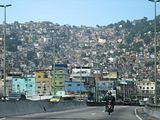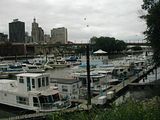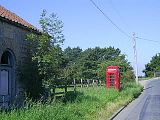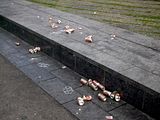
Did you watch Slumdog Millionaire? As you watched it did you think that the answers to our climate change and sustainability problems could be found in the slums of cities such as Mumbai and Hanoi? Did you like me think that slum living cannot possibly be a “good thing” and that the poverty of these densely packed areas needs to be addressed as a global humanity problem? We could be wrong apparently.

I have just read something that flies in the face of everything I have held as vitally important to living well in strong community. My gut feeling, and I know I am not alone, is that rural living is idyllic, healthy for body and soul, allowing us to get in touch with the earth beneath our feet and the natural world around us. Why otherwise do city dwellers rush to the countryside for their weekend breaks away from the bright lights? Sure we go up to the city for culture and entertainment, but I always breath a huge sigh of relief when I return from such a trip to the open rural space where I am fortunate enough to live. It seems to me counter intuitive to live in a city.

Inspired by a densely populated, tight knit houseboat community in San Francisco Bay, architect
Peter Calthorp believes that good community, or new urbanism as he calls it, is based on what he has termed “walkability,” when everyone has to meet with everyone else on a regular basis as they all go about their day to day business. That certainly satisfies the sound community envisaged by Chief Rabbi Jonathan Sacks where everyone knows everyone else by name.

So I can see the sense of this relatively new idea. Very densely packed conurbations, slums, urbanization by any name, are hugely efficient in the use of resources, energy, hospitals, schools, for example, and in sustainability with recycling etc. Many of us have seen TV documentaries following the recycling efforts of children on the rubbish tips of slums, where it seems everything has a further use. Slums produce innovative businesses and occupations, not shackled by all the rules and regulations of modern life. That does sound appealing. But of course there is a downside – in health issues for example.
All this and more is in a fascinating article I found in
Prospect magazine, (Feb 2010 How Slums Can Save the Planet), while visiting my son last weekend. It is written by Stewart Brand, one of the world’s most influential and controversial environmentalists – see for example his latest book
Whole Earth Discipline.
I am impressed with the arguments that Brand and Calthorp use and I recommend you read the article in full. I now have the book which I shall read and I shall post a review at some time in the near future.
I cannot help but feel that something is missing in these ideas, something valued highly by human ecologist Alastair McIntosh for example, so beautifully expressed in his book
Soil and Soul. Yes that’s it; humanity needs soul and spirit. Institutional religion may be on the decline, but spirituality is definitely and significantly on the increase. Indeed the reason that some churches are in decline may even be because they have lost sight of the spiritual side of their worship, they do not provide what the public want and need. I have just read two really good books by zoologist David Hay. He is also a practicing Christian but he is certainly not “preachy.” In
Something There: The Biology of the Human Spirit, Hay explores the results of his own carefully designed experiments into spirituality and religion over 30 years, and skillfully makes the case for spirituality as the vital ingredient for human well being and for meaningful lives.
His later book,
Why Spirituality is Difficult for Westerners, is in fact an expansion of one of his chapters in
Something There. In this short and well -written essay in four chapters, he explains why he thinks that spirituality or what he otherwise describes as relational consciousness, far from being something we pick up from indoctrinations in our upbringing, is actually something we are born with, that has survived through biological natural selection as something that is of value to our survival. This, he says, underpins both religion and ethics, indeed is a precursor of both. But it is threatened, at our peril, by the new individualism, the Me Millenium. I have written fuller reviews of both books on Amazon.com and Amazon.co.uk.
Both Hay’s books are well supported with scientific and theological references as well as with illustration from poetry and prose – which adds a further and interesting dimension to his writing. I recommend them both.
But how does this idea, that new urbanization holds the key to our global problems, fit in with nature and the countryside? Whilst controversy and debate continues over the facts surrounding climate change and our role in handling this, the ecologists have little doubt that we are part of a complex web of life and we are damaging this fragile global ecosystem. We have become aware that any of our actions must weave into that whole living system. Traditional indigenous cultures understand that and activist and futurist
Elizabet Sahtouris feels strongly that there are important lessons to be learnt from them. I so agree. They have wisdom that we have lost in our urbanization. As James Lovelock reminds us, in his book
The Revenge of Gaia, (London: Penguin Books Ltd, 2006), we need “to renew that love and empathy for nature that we lost when we began our love affair with city life.” Brand suggests that we need a new profession, that of “active urban ecology.” Who then protects the countryside, and for what purpose? I don’t like the sound of this at all!
 What brought everyone out to enjoy this garden? We have a scheme in the UK called the National Garden Scheme. Every year people open their private gardens up and down the country for the public to come and view, to raise funds for charities. In the last 10 years the scheme has donated more than £23million to different national and local charities, including for example Marie Curie Cancer Care, Macmillan Cancer Support, Help the Hospices, and other major charities, and more than 1000 local charities nominated by garden owners. Add to an interesting garden the teas and home made cakes which are almost invariably available, and a pleasant afternoon is guaranteed. The gardens vary from the tiniest town plots to the largest estates. They are all different, all show off different features, and very often the owner is on hand to answer questions. If you are not already a supporter, I can strongly recommend that this year you obtain the little yellow directory for your area (often available in garden centres or nurseries - otherwise obtainable by post- see the website) and try a few for yourself.
What brought everyone out to enjoy this garden? We have a scheme in the UK called the National Garden Scheme. Every year people open their private gardens up and down the country for the public to come and view, to raise funds for charities. In the last 10 years the scheme has donated more than £23million to different national and local charities, including for example Marie Curie Cancer Care, Macmillan Cancer Support, Help the Hospices, and other major charities, and more than 1000 local charities nominated by garden owners. Add to an interesting garden the teas and home made cakes which are almost invariably available, and a pleasant afternoon is guaranteed. The gardens vary from the tiniest town plots to the largest estates. They are all different, all show off different features, and very often the owner is on hand to answer questions. If you are not already a supporter, I can strongly recommend that this year you obtain the little yellow directory for your area (often available in garden centres or nurseries - otherwise obtainable by post- see the website) and try a few for yourself. 



















































